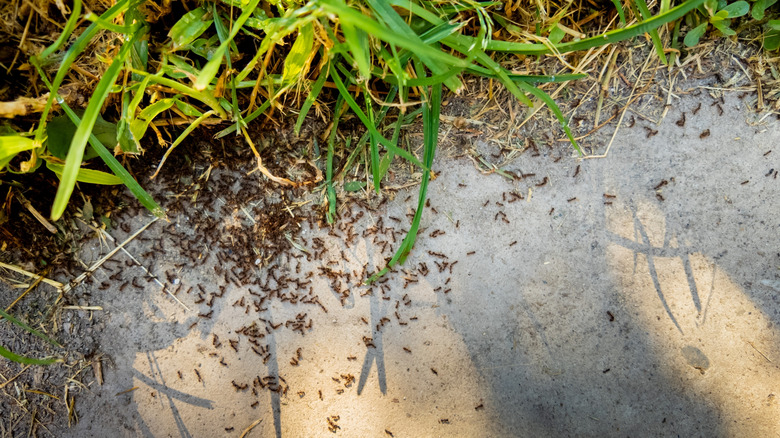Naturally Repel Ants From Your Garden By Planting This Fragrant Herb
In our gardens, ants play an impressive, understated role. As they tunnel through the dirt to build their nests, they're simultaneously providing beneficial aeration to the soil. Leaves and twigs used to construct their nests break down and serve as fertilizer for our gardens. Ants also play a vital role in balancing the ecosystem, aiding in pollination as they traipse across flowers or by being the meal for another insect or bird.
But let's be honest. Most of us are eager to get rid of ants in the garden. We don't want them setting up their colonies anywhere near our house. In addition to being an unpleasant sight in the garden, they can disturb the roots of our plants as they burrow through the soil. They also protect aphids, which are like vampires that suck the life out of plants. Fire ants, commonly found in vegetable gardens, like to chew on young seedlings. If you're looking for a way to repel or kill ants without pesticides, consider planting thyme — and you'll end up with fresh herbs for your meals as an added bonus.
Thyme (Thymus spp.), an evergreen herb that belongs to the mint family, is easy to grow (here's how to start thyme from cuttings) and is hardy to the USDA Plant hardiness zones 5 through 9. It tolerates partial shade, but is more likely to thrive and produce flowers — which attract the key pollinators — in full sun. You can grow it in a pot or even as a perennial groundcover.
Why ants dislike thyme
The strong scent of thyme (especially lemon thyme) may possibly mix up the ants' pheromone trails that serve as the ants' communication and navigation system. Without a solid grasp on the trail, ants can lose their sense of direction. This complicates their quest for food or the journey back to their nest.
A 2023 study published in Insects sought to understand if carvacrol and thymol — both naturally occurring compounds found in thyme oil — could be used to deter fire ants. Researchers found that carvacrol was most effective against red, black, and imported fire ants, with thymol coming in second place. In fact, thymol has been used as a repellent for many years, also deterring mosquitoes and fruit flies.
Another benefit is that the U.S. Food and Drug Administration has approved both of these substances as a food flavoring, which means that it's safer than many chemical pesticides. This is especially noteworthy for gardeners who are looking for an insect repellent that is not harmful to their health or the environment. If you're looking for other plants or herbs to repel ants or other pests, try chrysanthemums, mint, basil, and bay.

